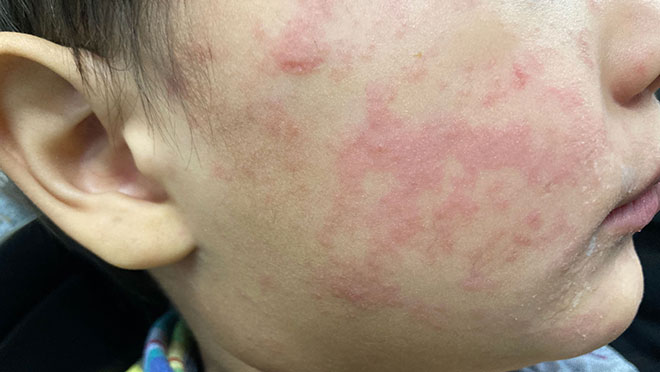Belize has two confirmed measles cases

The child’s cheek shows the characteristic rash associated with measles
From The Ministry of Health & Wellness, Belize
The Ministry of Health & Wellness in a release issued today, April 13, 2025, has confirmed two positive cases of measles.
These are the first confirmed cases of measles in Belize for over 30 years.
The cases were identified in individuals from the Corozal and Cayo districts who recently returned from a trip to Mexico.
The group of travellers arrived back in Belize on March 31. Two of the members later developed fever and rash symptoms. The health authorities from The Health and Wellness Department of Belize collected samples, which tested positive for the measles virus.
All members of the travel group are now in isolation and are being closely monitored.
To date there have been no cases of measles reported here in the Cayman Islands, which is also being closely monitored by the local Health Authority.

Measles rash on torso of young child
According to the World Health Authority:
- Measles is a highly contagious, serious airborne disease caused by a virus that can lead to severe complications and death.
- Measles vaccination averted more than 60 million deaths between 2000 and 2023.
- Even though a safe and cost-effective vaccine is available, in 2023, there were an estimated 107 500 measles deaths globally, mostly among unvaccinated or under vaccinated children under the age of 5 years.
- The proportion of children receiving a first dose of measles vaccine was 83% in 2023, well below the 2019 level of 86%.
Measles can affect anyone but is most common in children.
Measles infects the respiratory tract and then spreads throughout the body. Symptoms include a high fever, cough, runny nose and a rash all over the body.
Being vaccinated is the best way to prevent getting sick with measles or spreading it to other people. The vaccine is safe and helps your body fight off the virus.
Before the introduction of measles vaccine in 1963 and widespread vaccination, major epidemics occurred approximately every two to three years and caused an estimated 2.6 million deaths each year.
An estimated 107 500 people died from measles in 2023 – mostly children under the age of five years, despite the availability of a safe and cost-effective vaccine.
Accelerated immunization activities by countries, WHO, the Measles & Rubella Partnership (formerly the Measles & Rubella Initiative), and other international partners successfully prevented an estimated 60 million deaths between 2000–2023. Vaccination decreased an estimated measles deaths from 800 062 in 2000 to 107 500 in 2022 (1).
Measles is one of the world’s most contagious diseases, spread by contact with infected nasal or throat secretions (coughing or sneezing) or breathing the air that was breathed by someone with measles. The virus remains active and contagious in the air or on infected surfaces for up to two hours. For this reason, it is very infectious, and one person infected by measles can infect nine out of 10 of their unvaccinated close contacts. It can be transmitted by an infected person from four days prior to the onset of the rash to four days after the rash erupts.
Measles outbreaks can result in severe complications and deaths, especially among young, malnourished children. In countries close to measles elimination, cases imported from other countries remain an important source of infection.

skin of a patient after three days with measles rash
Treatment
There is no specific treatment for measles. Caregiving should focus on relieving symptoms, making the person comfortable and preventing complications.
Drinking enough water and treatments for dehydration can replace fluids lost to diarrhoea or vomiting. Eating a healthy diet is also important.
Doctors may use antibiotics to treat pneumonia and ear and eye infections.
All children or adults with measles should receive two doses of vitamin A supplements, given 24 hours apart. This restores low vitamin A levels that occur even in well-nourished children. It can help prevent eye damage and blindness. Vitamin A supplements may also reduce the number of measles deaths.
Prevention
Community-wide vaccination is the most effective way to prevent measles. All children should be vaccinated against measles. The vaccine is safe, effective and inexpensive.
Children should receive two doses of the vaccine to ensure they are immune. The first dose is usually given at 9 months of age in countries where measles is common and 12–15 months in other countries. A second dose should be given later in childhood, usually at 15–18 months.
The measles vaccine is given alone or often combined with vaccines for mumps, rubella and/or varicella.
Routine measles vaccination, combined with mass immunization campaigns in countries with high case rates are crucial for reducing global measles deaths. The measles vaccine has been in use for about 60 years and costs less than US$ 1 per child. The measles vaccine is also used in emergencies to stop outbreaks from spreading. The risk of measles outbreaks is particularly high amongst refugees, who should be vaccinated as soon as possible.
For more on measles see https://www.who.int/news-room/fact-sheets/detail/measles





